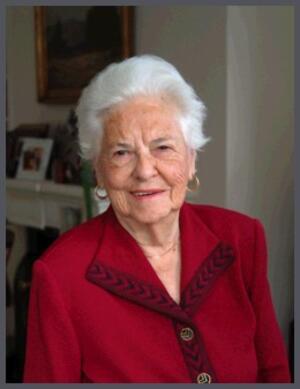Elsie Frank
My mother Elsie Frank was 70 when she began her career as an advocate. She continued for the next 23 years, going on to become a leader and then President of the Massachusetts Association for Older Americans, and a familiar figure in progressive coalitions. I have her picture above my desk at home, standing before a crowd, mike in one hand, the other holding the hand of Ed Cooper, President of the National Caucus of Black Aged.
Mother’s public debut was not exactly spontaneous—in 1982 my brother Massachusetts Congressman Barney Frank faced a tough re-election campaign. We were all engaged, but probably the most effective family effort was a campaign commercial featuring Mother, in her rocking chair, explaining that she trusted Barney to protect Social Security.
The ad was a success, in the campaign and after, and won national acclaim. Mother was a star. But while the ad introduced her as a public figure, it was her own voice and comments that established her as a leader. One of the still too-few women speaking for the elderly—in spite of the fact that most of the elderly are women—she wrote her own speeches, did her own research, and clipped newspaper and magazine articles which sparked her interest or aroused her anger. She spoke on panels with distinguished physicians, researchers, and academics; she spoke from her own experience and for the elderly and their families.
Mother did not see her advocacy as limited; she spoke for frail elders worried about their access to healthcare or the adequacy of their retirement savings; and for the need to raise the minimum wage so that every family could succeed. She was a familiar presence at the Massachusetts State House, in public rallies and private meetings; speaking for seniors and against unfair treatment for anyone. When a Massachusetts Constitutional Convention considered banning gay marriage, Mother wrote to say that she loved all her children equally; the state should not discriminate among them.
Born in Bayonne, New Jersey, to immigrant parents, Mother was raised by older sisters after her parents died. She was a star student in high school but college was out of reach; instead, she went to work as a legal secretary, polishing skills that would later be useful after my Father’s early death, when she went back to work at a large Wall Street law firm, and then resettled in Boston, again quickly finding work as a legal secretary. She may have given the firm the impression that she was somewhat younger than she really was, explaining to us later that she was perfectly capable of working. She finally retired as her public career took off.
Barney remembers watching Mother at the computer, which she adopted after the age of 80, sending emails to grandchildren as she talked about her memories of when the family’s first automobile replaced the horse and wagon. It seemed to us an example of the scope of change in her life, and her ease in welcoming—and mastering—it. As she found her voice, she never doubted her responsibility to use it for the public good.
Mother was a valuable advocate for the candidates and causes she believed in. For her grandchildren, she was a treasured companion, always ready to go to out to a street fair, an ice show, or a school play. For all of us, she was a loving parent and a role model, an inspiring example of remaining active and engaged while growing older. I hope I can keep up with her.



